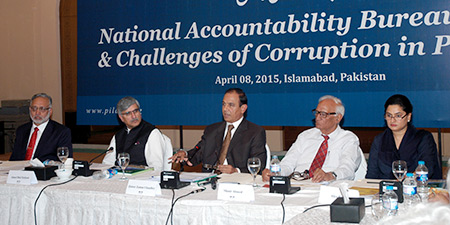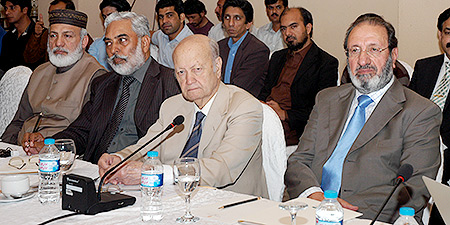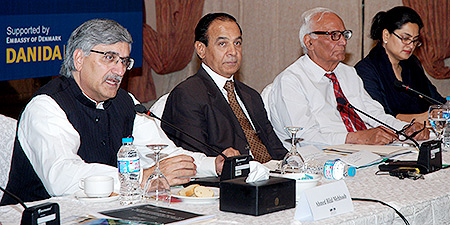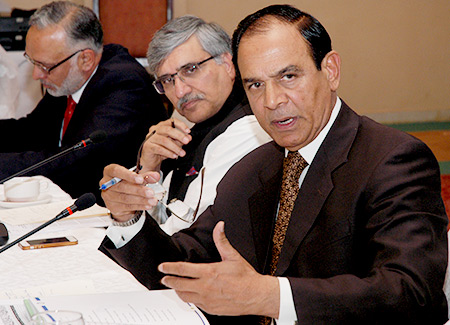|
|
| |
| EVENTS |
|
|
> NAB Performance in 2014 Improved by 54% : Chairman NAB
|
|
|
| |
- Whistle-Blowers Protection Law prepared by NAB
- Diluting Accountability Law will not be acceptable: PILDAT
April 08: The performance of NAB has improved by 54% in 2014, said Chairman NAB, Mr. Qamar Zaman Chaudhry, while addressing the PILDAT Public Forum on the National Accountability Bureau and the Challenges of Corruption in Pakistan. While presenting his perspective on performance of the NAB, Mr. Chaudhry said that the NAB has prepared a law for the protection of whistle blowers as well. |
|
| |
In response to the Chairman NAB indicating that a new law may be on the anvil to replace the NAO 1999, Mr. Ahmed Bilal Mehboob, President PILDAT, said that any efforts to dilute effective accountability requirements would be faced with stiff resistance inside and outside the Parliament.
|
|
| |
The PILDAT Forum was organized to review the performance of the NAB under PILDAT's programme of evaluating performance of key State institutions for the benefit of the citizens.
|
|
| |
Alongside Mr. Qamar Zaman Chaudhry, Chairman NAB, Dr. Munir Ahmed, Founding President of the Islamic Countries Society of Statistical Sciences, Brigadier (Retd.) Musaddiq Abbasi, former Director General, Awareness and Prevention NAB, and Mr. Ahmed Bilal Mehboob, President PILDAT, spoke at the Forum.
|
|
| |
Mr. Qamar Zaman Chaudhry commended PILDAT's efforts towards strengthening the State institutions through reviewing their performance in an objective manner. He said that corruption is a complex problem that affects development of both democratic and economic institutions. He agreed that while the application of the NAO was selective earlier, during the previous year, references have been sent to the Accountability Courts in major cases on corruption such as Railways Public Procurement, Steel Mills, NICL and Police weapons scandal case, etc.
|
|
| |
Dr. Munir Ahmed said that the comparative study of the three countries - Japan, Hong Kong and India shows different models in practice in combatting corruption. Pakistan falls within the model with strong legislative framework and multi agencies for enforcement. Japan and Hong Kong both rank high in corruption perception index. In Japan, petty corruption has been removed from the country however there is mega corruption in Government and business. Hong Kong has a more effective system with independent judiciary and political will along with the public support. There are many similarities between the anti-corruption models followed by Pakistan and India in which there are multi agencies but weak political will and public support to eradicate corruption.
|
|
| |
Brigadier (Retd.) Musaddiq Abbasi believed that the term corruption has been defined vaguely and has to be defined in more strict terms with more severe punishment. He said that in many countries including Iran and China, there is a death penalty for anyone against whom the charges of corruption are proved. The process of anti-corruption includes awareness, prevention and enforcement and only a combination of effective implementation of all these three aspects will show results. The performance assessment and accountability within NAB needs to be provided for in the very framework and structure of NAB. He suggested that the clause of voluntary return should be deleted to remove the opaqueness of the system.
|
|
| |
In his welcome remarks, Mr. Ahmed Bilal Mehboob, said that PILDAT has begun to review performance of key State institutions from the citizens� perspective in order to improve their performance. PILDAT has carried out a performance review of the NAB owing to the fact that it is a primary institution charged with the responsibility to ensure effective, across-the-board and transparent accountability on the number one issue of corruption in Pakistan. Pakistan is rated amongst the countries with high incidence of corruption that constitute top 25% corrupt countries. On the corruption perception index, Pakistan has a score of 29, which is the best ever score but is still not satisfactory. According to the Global Competitiveness Report 2013-2014, prepared by the World Economic Forum, corruption is the number 1 problem in doing business in Pakistan. Pakistan is losing US $15 billion annually. All of the issues facing the country at the moment have roots in the endemic of corruption. Yet the legal framework of the NAB under which it operates is comparatively quite effective. Recently the process for the appointment of Chairman NAB has included the provision of meaningful consultation and resulted in the bi-partisan appointment. He recommended that for sustained improvement for anti-corruption efforts, the UNCAC framework can be used by the NAB which must also make the review process under UNCAC transparent and public.
|
|
| |
The PILDAT Forum was attended by MPs, senior and veteran politicians, senior
civil servants and civil society representatives alongside the media.
The Forum was
set in the background of analytical papers that have been commissioned
by PILDAT to review the performance of NAB as well as international
comparative perspectives on effective anti-corruption. This
includes:
This forum and
paper by PILDAT are part of a programme to ascertain periodically
the performance of State Institutions and Practices in Pakistan.
PILDAT has undertaken this
assessment under its Democracy and Governance Programme for
which it has received financial support from the Danish International
Development Agency - DANIDA, Royal Danish Government.
 |
|
| |
|
|
| |

|
|
| |
|
|
| |

|
|
| |
|
|
| |

|
|
| |
|
|
| |

|
|
|
|
|
|
|
|
|